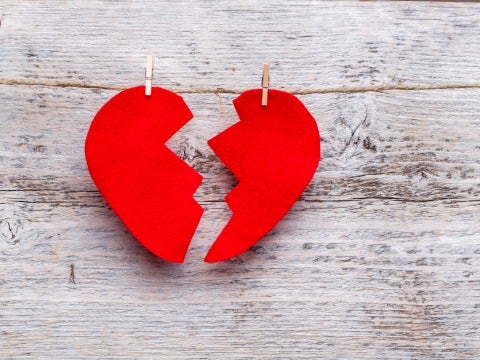Erase Your Ex With New Anti-Love Drug
We can't even believe this is real.

Scientists are taking Kesha's song seriously. Is love a drug? Can someone's love be your drug? They think so, and they're ready to manipulate the crap out of it and create an anti-love drug. Seriously.
What exactly goes on in the brain when it comes to love?
What happens in the brain to create "that love feeling" is just beginning to be understood by scientists, but research suggests that the same chemical reaction takes place in the brain in love-situations and in addiction cases. Therefore, love is indeed a drug. When we're in love, we are addicted to our partners. The same goes for rejection. Helen Fisher, a biological anthropologist at Rutgers University, says, "The bottom line is that a lot of data on people rejected in love show that the major pathways linked with addiction become activated."
So how do they get past the rejection? Back to the anti-love drug concept. Brian David Earp, a research fellow at Oxford University's Uehiro Centre for Practical Ethics, and his colleagues published a series of papers regarding the chemical enhancement (or disruption) of our romantic connections. Basically, if love is a drug, then scientists can manipulate its chemistry. The anti-love drug "would be any substance that works to block or diminish a feeling of love, lust, attraction or attachment," says Earp. By taking this anti-love pill, people could potentially delete the loving feelings they have for someone.
Where are we now?
Some varieties of anti-love drugs are already on the market disguised as antidepressants — Prozac, for example. SSRIs (selective serotonin reuptake inhibitors) raise levels of serotonin, and are notorious for interfering with the libido. Common side-effects are reduced sex drive and inability to orgasm. Helen Fisher thinks their side effects go far beyond the physical aspect of attraction and delve right into the attachment and attraction aspect (which is the key to romantic love, according to her research.) She says, "I get an email about once a week from someone who says that my wife and I were in love, married for 12 years, and then she started taking Prozac. [Now she] wants a divorce and says she doesn't feel a thing for me."
As of 2013, one in 10 Americans were on some form of antidepressant. The number is even higher among women in their 40s and 50s: one in four. How many of them, we wonder, are being negatively affected? And how many don't even realize it?
How can it be utilized?
Earp uses the example of a woman who is in love with her abusive husband — so much so that she can't leave him. By taking the pill, she would be able to cut all emotional ties with him. That's good, right? Earp believes it is (as long as the woman willingly takes the pill). There's another problem: someone being forced to take the anti-love drug. What if they like loving who they love? What if someone forcibly applied the drug to a perfectly happy gay man or woman, simply to change his or her brain chemistry because the first person deemed it "unnatural"? Such backwards thinking exists.
Earp says, while we already have drugs that "affect relationships," we now have to decide "whether we want to be thoughtful [about how we use them] and try to make things better rather than worse."
What do you think of the anti-love drug? Would you take it, and alter a huge part of what makes you, you? Without real love, our lives are intensely diminished. The pain of a love lost is part of what shapes us. So why would we want to cut that part of ourselves out merely to be spared pain that will eventually fade?
More juicy content from YourTango:

